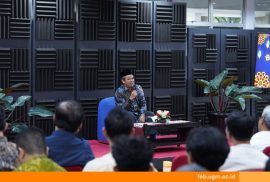On Monday (18/12), the Faculty of Economics and Business, Universitas Gadjah Mada (FEB UGM) conducted a self-development session for professional staff. This self-development session, “Good Money Habits for a Great Life,” was conducted online. The event began with singing the national anthem, “Indonesia Raya,” and the university anthem, “Himne Gadjah Mada”. The program continued with a welcome speech from Gumilang Aryo Sahadewo, S.E., M.A., Ph.D., the Vice Dean for Research, Community Service, Collaboration, and Alumni of FEB UGM.
The self-development session featured Prita Hapsari Ghozie, S.E., M.Com., GCertFP, CFP, QWP, AEPP, who is the Principal Consultant and Chief Executive Officer (CEO) of ZAPFinance, as well as a lecturer in the Department of Accounting at the Faculty of Economics and Business, Universitas Indonesia. Anggraeni Pranandari, S.E., M.Sc., a lecturer in the Department of Management at FEB UGM, moderated the event. The discussion began with explaining the reverse causality between financial and mental health issues. According to a study by the Money and Mental Health Policy Institute (2019), financial health issues are the root cause of 86 percent of mental health problems. Conversely, mental health issues also contribute to 72 percent of financial health problems. Therefore, individuals need to master financial management.
Effective money management is crucial for three reasons. First, sound financial management can reduce the stress experienced by individuals, as 45 percent of human stress is caused by financial problems. Second, mental health can improve, considering that 72 percent of mental health is influenced by financial health. Third, competent financial sponsorship can make marriages more harmonious, as 24.41 percent of divorces in Indonesia are based on economic conflicts.
Furthermore, a study by PwC shows that stress due to financial conditions has a tangible impact on the health and well-being of individuals. Financial stress was found to negatively affect sleep adequacy, mental health, self-confidence, physical health, and relationships with family members at home. Considering the destructive impact that can be caused, how can one achieve financial well-being?
Three steps can be taken to achieve financial well-being: financial education and financial literacy, and only then can one reach a point of financial well-being. However, financial inclusion in society is higher than financial literacy. In other words, society’s access to financial services has expanded, but a relatively low literacy level accompanies it. Therefore, a significant task for organizations is to improve financial literacy. Financial literacy development can be achieved through numeracy skills, understanding inflation, and awareness of diversification.
The discussion continued with an evaluation of financial conditions. Everyone has primary goals in life. Therefore, evaluation is essential to determine the actual financial capacity of individuals to achieve their expected goals. Evaluation can be done qualitatively or quantitatively. Qualitative evaluation involves a questionnaire containing “yes” or “no” questions. Meanwhile, quantitative assessment involves understanding net worth and cash flow calculation.
Participants in the self-development session then played an interactive game through the Kahoot platform. This game aimed to train the audience’s knowledge in categorizing various types of assets. Subsequently, the presentation continued with a discussion of healthy cash flow targets. As a primary principle, monthly cash flow should be positive. Additionally, the maximum installment should be 30 percent of income. Moreover, an individual should be able to save 10 percent of their total revenue.
Next, the urgency of building good money habits was explained. There are five strategic steps to create these habits. Firstly, an individual must be able to prioritize. Secondly, one should be wise in avoiding consumer debt. Thirdly, individuals are also encouraged to create a household budget.
Fourthly, emergency funds and protection should be prepared as early as possible. Lastly, an individual should start saving and investing. The session concluded with a Q&A session between the audience and the speaker. This professional staff development program also represents FEB UGM’s effort to support Sustainable Development Goals (SDGs), especially goals number four (quality education) and number eight (decent work and economic growth).
Reportage: Rizal Farizi






